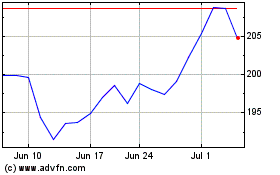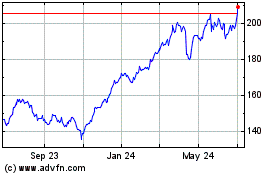By Peter Rudegeair, Telis Demos and Emily Glazer
Some of the nation's largest banks warned Thursday that the
benefits investors anticipated from rising interest rates and the
election of Donald Trump as president aren't panning out quite as
quickly as many had hoped.
J.P. Morgan Chase & Co. and Citigroup Inc. posted sharp
increases in first-quarter profit, fueled by a continued rebound in
their Wall Street trading businesses. But the results, along with
those from Wells Fargo & Co., highlighted that the rising
interest rates, more robust loan demand and pro-growth policies
that many bank investors were betting on after Mr. Trump's election
had so far failed to yield breakout gains.
Shares at all three banks fell more than the Dow Jones
Industrial Average, which dropped 0.7%. Wells Fargo led the way
with a 3.3% decline, while J.P. Morgan lost 1.2%.
While bank stocks surged in the wake of Mr. Trump's surprise
election victory, they have slipped the past month as investors
grow more doubtful about whether broad measures like lending growth
and profitability will catch up with loftier valuations.
Bank executives told investors on a series of conference calls
that they were sanguine that U.S. policy makers' goals of loosening
financial regulations and cutting tax rates would eventually help
boost growth.
"When you have a new president and they get going... it's going
to be a sausage-making period," J.P. Morgan Chief Executive James
Dimon said on a conference call with analysts. To expect it to be
smooth, "that would just be silly."
Investors are feeling less patient.
"There are itchy trigger fingers" from investors looking to
sell, said Christopher Davis, a veteran portfolio manager at Davis
Funds, which manages about $25 billion in assets and recently
reported owning large stakes of J.P. Morgan and Wells Fargo.
While he likes the steady and consistent growth both companies
are likely to offer in coming years, he says that many investors in
recent weeks have grown more worried about banks' lending
potential.
At both J.P. Morgan and Citigroup, profit rose 17% in the first
quarter, with the capital-markets arms of each bank being the
brightest spots of their reports. Wells Fargo, which has a
relatively slimmer footprint on Wall Street businesses, said its
first-quarter profit was flat.
Commercial loan balances didn't change at J.P. Morgan and Wells
Fargo compared with the fourth quarter of 2016. New auto loans
declined 17% at J.P. Morgan and 29% at Wells Fargo compared with
last year's first quarter. John Shrewsberry, Wells Fargo's finance
chief, said that signs of rising delinquencies and deteriorating
used-car values are causing the bank to be more cautious.
In Citigroup's North American consumer-banking group, profit
fell 25%, driven by credit losses on some credit cards. At J.P.
Morgan's and Wells Fargo's consumer-banking arms, profit fell 20%
and 9%, respectively.
PNC Financial Services Group Inc. bucked some of the trends,
saying stronger loan activity helped its earnings beat expectations
Thursday. The Pittsburgh bank attributed the growth in part to
markets where it is expanding, including Dallas, Kansas City and
Minneapolis.
In coming quarters, big banks hope that interest rates continue
climbing, since that would essentially give them more pricing power
in lending products.
In March, the Federal Reserve moved its target short term rate
higher, its third interest-rate bump in the past two years. Big
banks earn more money by lending out their vast deposits when
interest rates rise. They also benefit from a larger gap between
short term and long term rates, a so-called steep yield curve.
J.P. Morgan said it expects net interest income to rise by about
$4.5 billion in 2017. Citigroup said it was now building into
future plans an additional rate increase, in June. That would help
bump up its expected year-over-year core interest revenue by $1.5
billion over the next three quarters.
But the bank also made a "modest reduction" in expectations for
loan growth. Rising rates have a downside in making some loans,
especially mortgage refinancing, less attractive to borrowers.
Wall Street trading desks were a bright spot. J.P. Morgan's
trading revenue increased 13% to $5.82 billion in the first quarter
of 2017, while Citigroup's rose 17% to $4.39 billion. Last year's
first quarter was a brutal one for each bank's trading arm, so the
latest results are coming off of a low base.
Fixed-income trading revenue was up nearly 20% at each bank,
reflecting higher activity in markets for government bonds and
other securities closely tied to interest rates. Investment-banking
fees at each bank were up nearly 40% thanks in part to underwriting
more bond deals for companies looking to lock in low borrowing
costs.
"There's good momentum, as we see things now," said Citigroup
CEO Michael Corbat. "Client engagement was high, and I think
remains high into the second quarter."
Meanwhile, Marianne Lake, J.P. Morgan's finance chief, said on a
conference call that she expected the Trump administration's agenda
would eventually lead to more hiring, spending and borrowing. But
she acknowledged that much of the economic activity hadn't yet
arrived. "It's completely understandable that optimism would lead
action."
Write to Peter Rudegeair at Peter.Rudegeair@wsj.com, Telis Demos
at telis.demos@wsj.com and Emily Glazer at emily.glazer@wsj.com
(END) Dow Jones Newswires
April 14, 2017 02:47 ET (06:47 GMT)
Copyright (c) 2017 Dow Jones & Company, Inc.
JP Morgan Chase (NYSE:JPM)
Historical Stock Chart
From Mar 2024 to Apr 2024

JP Morgan Chase (NYSE:JPM)
Historical Stock Chart
From Apr 2023 to Apr 2024
